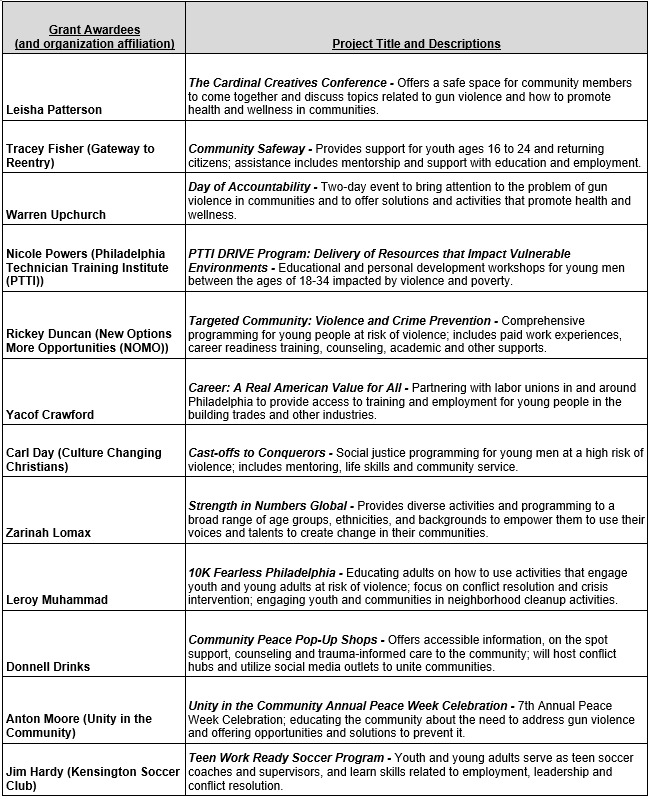PHILADELPHIA – The City of Philadelphia today awarded more than $700,000 to nearly four dozen community-based organizations that offer violence prevention services and supports.
Efforts being funded include job training in areas such as culinary arts, barbershops, and entreneurship; “Peace Pop Up Shops” that offer trauma-informed care for those affected by violence; grief support programming for impacted families; and training for young adults to become “Peace Ambassadors” in their neighborhoods. The funding also supports workshops, sports activities, discussion groups, and ‘safe spaces’ for young men who are at the greatest risk for gun violence.
The awards represent the first round of funding in the Targeted Community Investment Grant Program, a key initiative of the Philadelphia Roadmap to Safer Communities. The grant application process, which opened in April, brought in 409 applications, from which 47 awardees were selected. The grants, ranging from $5,000 to $20,000, will support both new and existing programs in neighborhoods impacted by violence to help prevent or reduce gun violence among youth and young adults living in these communities.
“The strong response to our call for grant applications clearly demonstrates that our communities are ready, willing and able to be part of the solution,” said Mayor Jim Kenney. “The dedication and ingenuity of residents and groups to preventing violence is inspiring. These grants are the first step towards the City providing support for our communities in a more tangible way.”
During the selection process, preference was given to organizations that are striving to meet the educational or employment needs of young men between the ages of 18 to 34. Also given preference were organizations willing to serve the most at-risk — young men living in the Philadelphia communities most affected by gun violence. The applicants were asked to provide a description of the program or activity to be funded, along with an explanation of how it will help prevent gun violence in the community, a budget that clearly shows how the funds will be used, and how the success of the project will be measured.
“Two of my frequent refrains in talking about the Roadmap are that we cannot police our way out of this problem, and that the City cannot do this alone,” said Vanessa Garrett Harley, Deputy Managing Director for Criminal Justice and Public Safety. “The wealth of great ideas and commitment found in these grant applications are testaments to both of those points. I am confident that from this partnership, this alliance, progress will come.”
A second application period is expected this fall. Applicants who were not selected are encouraged to apply for this grant program in the next round later this year.
The grants, which total $708,354, are funded with a combination of City dollars, thanks to a transfer ordinance approved earlier this year by City Council, and a portion of a $500,000 state grant announced last Fall to expand the Community Crisis Intervention Program (CCIP) in Philadelphia neighborhoods most prone to violence.




The grants will be administered by the Urban Affairs Coalition with oversight by the Office of Violence Prevention. Awardees in many cases are collaborating with others in the community who are not included in this list.
Beyond the Targeted Community Investment Grant Program, Mayor Kenney’s new budget and Five Year Plan — approved last week by City Council — also calls for increased support for grants for community groups on the front lines of neighborhood violence as part of $30 million in additional investments to support the Roadmap. Among other investments:
- Additional funding for the Community Crisis Intervention Program (CCIP) and the Youth Violence Reduction Partnership (YVRP).
- Enhanced L&I enforcement for unsafe and abandoned properties, vacant lots, and side yards in high risk neighborhoods.
- Nearly $12 million in funding for Neighborhood Resource Centers (NRCs), which give people returning from a period of incarceration, or on court mandated supervision and their families, access to a broad range of services to support successful reintegration and ultimately lower recidivism.
- Additional resources for “Operation Pinpoint,” the Police Department’s multifaceted crime-fighting and information-sharing strategy.
